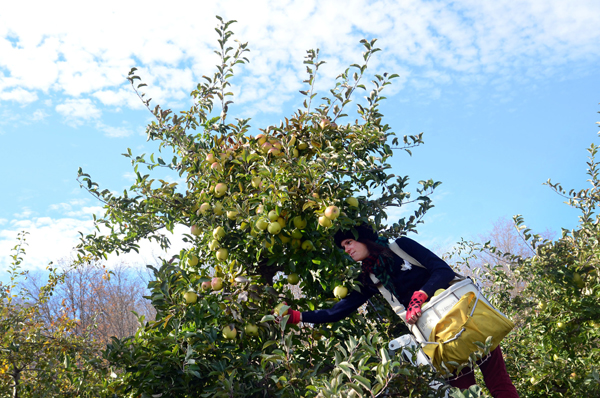 |
|
Apple picking at Black Diamond Farm in Trumansburg, NY. [Photo/Agencies]
|
It turned out there was a lot to discover. New York, the second-largest apple-growing state in the country after Washington, has long been famous for its apples. It is the home of heirloom varieties like the Esopus Spitzenberg, which is said to have been Thomas Jefferson's favorite apple, and its hills are littered with wild fruit trees descended from overgrown, abandoned orchards.
Over the last decade, a growing number of New York orchards have begun fermenting their own small-batch ciders. In 2011, Glynwood, a local agriculture advocacy nonprofit, introduced Cider Week (ciderweekny.com) to promote the budding industry. (There are now iterations in New York City, the Hudson Valley and the Finger Lakes; the Finger Lakes event starts on Oct 3.) Having found a dozen or so cideries, as cider breweries are known, within driving distance of my Brooklyn home, I planned a five-day intrastate road trip during Finger Lakes Cider Week, which took my husband, Tim, and I through some of the state's most spectacular terrain at the height of its seasonal glory.
The first scheduled stop was Ithaca, our college town base for exploring the rural Finger Lakes. But when I noticed that Applewood Orchards, the maker of Naked Flock, a cider with artful labels and a solid reputation, was on our way, just off State Route 17, we decided to detour. At the end of a gravel lane we found a theme park version of an apple orchard.
There were children on a pick-your-own field trip and weathered barns decorated with dried corn stalks. A multigenerational family farm, Applewood has survived by dabbling. On top of its farm stand and farmers' market business, there are wagon rides, puppet shows, live music, even a winery that turns out a dozen or so wines made from New York State grapes. Naked Flock is a relatively new addition, and while its ciders were fresher and less cloying than their mass-produced cousins, they were also less complex than the bone dry, bittersweet still and ice ciders I'd soon experience.
In fact, though I didn't know it at the time, there seems to be something of an inverse correlation between an orchard's status as a tourist attraction and the quality of its drink. With a couple of exceptions-Slyboro Cider House near the Vermont border and Harvest Moon Cidery in Cazenovia-the most exciting ciders we tasted came from producers that weren't open to the public. The beauty of Cider Week is that it invites these small-scale, sometimes reclusive cider makers to share their process and product, to host tours, lectures and tastings.

